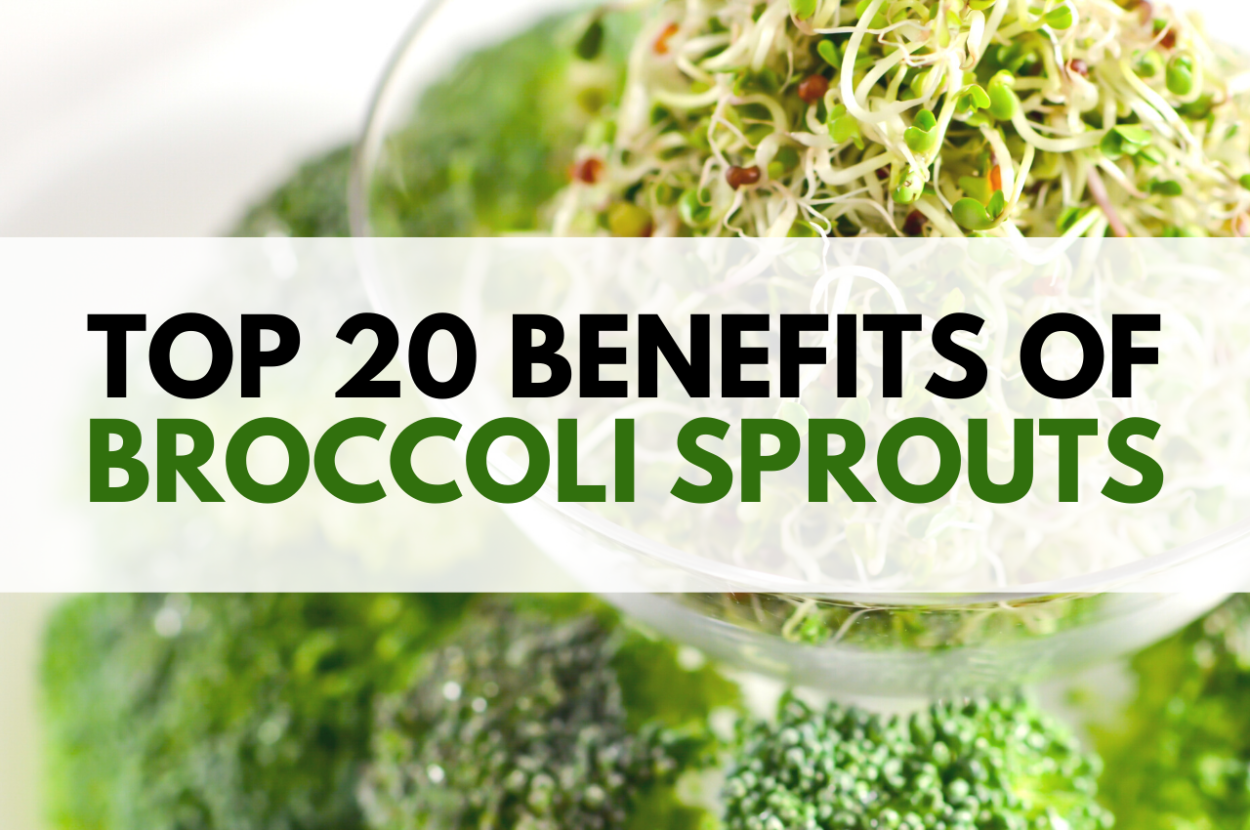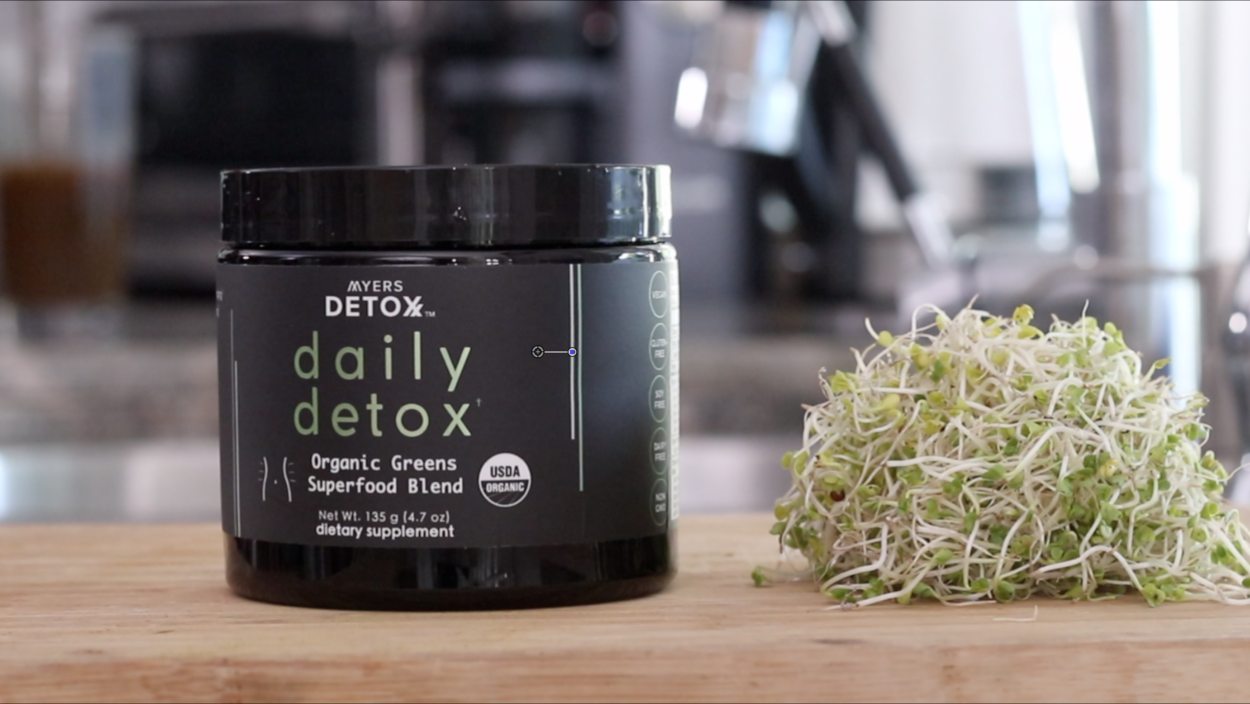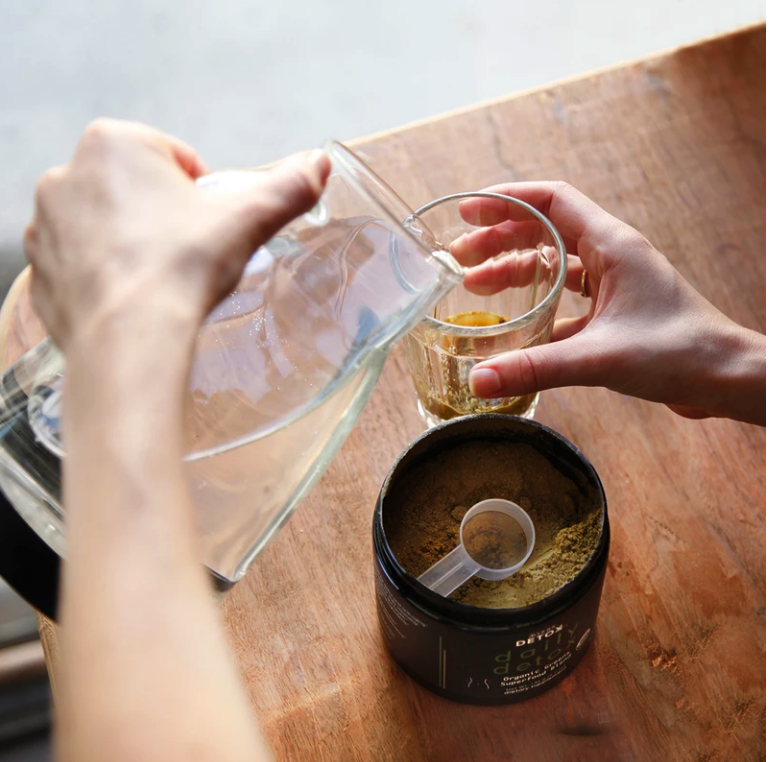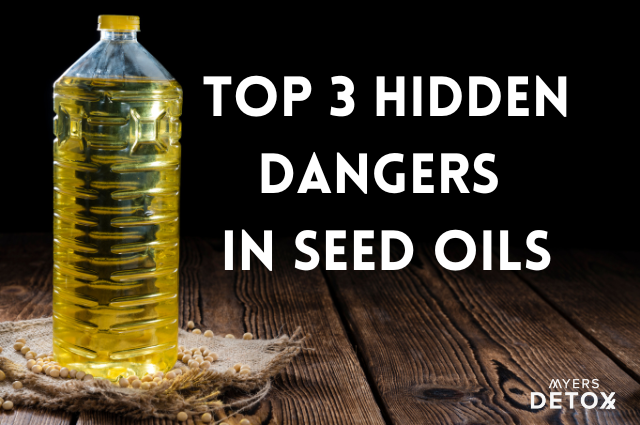What sets broccoli sprouts apart?
There are two health-promoting compounds found in abundance in broccoli sprouts — glucoraphanin and sulforaphane. These two bioactive compounds switch on your body’s detox, antioxidant, anti-inflammatory, and brain-supportive pathways. Glucoraphanin acts as a precursor to sulforaphane and is activated by the enzyme myrosinase. Both of these constituents have been at the center of hundreds of research studies for their health-promoting properties.
The foundational benefit of broccoli sprouts is their impact on your detox pathways. If you’ve been feeling physical or mental fatigue, brain fog, stress, and just generally not at the top of your game it’s likely that you have toxic buildup in your body. Broccoli sprouts work by supplying your liver with the nutrients it needs while upregulating your genes for detox.
If you’re wondering what consuming these young sprouts could do for your body, here are the top 20 benefits of broccoli sprouts:
Top 20 Benefits Of Broccoli Sprouts
#1 Supports Phase Two Liver Detoxification
Toxic overload happens in your body when fat-soluble chemicals are ingested and accumulate in your tissues. Unlike water-soluble compounds, fat-soluble compounds don’t get flushed out on a regular basis. Instead, they stick around and lodge into lipid dense areas of your body like your cell membranes and fat tissue.
This is where your body’s detoxification process comes in.
In your liver, detox happens in two phases. In the first phase, toxic chemicals are neutralized by enzymes that live on the membranes of your liver cells. The enzymes become active in the presence of toxins and convert toxic chemicals into less harmful intermediates.
In this process, however, reactive oxygen species (ROS) may form, creating the potential for oxidative damage within your cells[1].
In the second phase of detoxification, the neutralized toxins are converted into water-soluble compounds allowing them to be excreted from your body via your bile or urine.
Your liver requires specific nutrients for both phase one and phase two detoxification pathways. In phase one, nutrients are required for the proper activation of toxin-neutralizing enzymes. In phase two, nutrients are required to assist in the conversion of fat-soluble chemicals into water-soluble compounds.
Sulforaphane (SFN) plays a vital role in phase two detoxification by aiding in the conversion of fat-soluble compounds into water-soluble compounds. This allows toxins to break free from your tissues and be flushed out of your body.
What’s more, SFN also induces antioxidant activity necessary to neutralize ROS produced during phase one detox. In this way, SFN not only enhances the excretion of harmful chemicals, but it also helps to neutralize potential damage of ROS[2].
#2 Increases Glutathione (Antioxidant) Support
Sulforaphane plays a crucial role in the production of glutathione(GSH).
GSH is a vital antioxidant compound, sometimes referred to as a “master antioxidant.” It plays a role in both phase one and phase two detoxification, not only helping to neutralize toxins but assisting in their elimination as well[3].
One of GSH’s primary jobs is to protect your cells from oxidative stress. It plays a central role in redox homeostasis (reduction-oxidation), which is the process of neutralizing free radicals[4].
#3 Turns On Cell-Protective Genes
Sulforaphane activates a transcription factor known as nrf2. Transcription factors are proteins involved in the expression of specific genes.
Nrf2, once activated by sulforaphane, is responsible for the expression of a number of cytoprotective (cell-protecting) genes. Cytoprotection involves a process by which chemical compounds defend your cells against harmful agents.
While other supplements like curcumin and resveratrol can also activate nrf2, research shows that SFN is not only more bioavailable, but also a more potent activator[5].
#4 Protects Against Traumatic Brain Injuries
Traumatic brain injury(TBI) is usually caused by a sudden jolt or blow to the head. TBI’s can range from mild to severe, with one of the primary complications being cerebral edema — inflammation and fluid in the brain.
Common cognitive symptoms associated with TBI include loss of memory, problems concentrating, and mood swings[6].
Research shows that sulforaphane can improve cognitive function in TBI by upregulating nrf2 transcription factor. In the case of cerebral edema, nrf2 can help reduce the amount of fluid crossing the blood-brain barrier, and therefore reduce swelling in your brain[7].
#5 Activates Genes That Fight Inflammatory Disease
The activation of nrf2 by sulforaphane induces over 200 cytoprotective (cell protective) genes. These genes play crucial roles in pathways that activate antioxidants, decrease inflammation, improve mitochondrial function, and remove toxic proteins and dysfunctional cellular debris[8].
As a result, an increase in nrf2 is associated with a decreased risk for a number of inflammatory diseases, including heart disease, kidney disease, lung disease, cancer, diabetes, and inflammatory bowel disease[9].
#6 Protects Your Eyes From Oxidative Damage
Whether you realize it or not, your eyes are constantly under assault from potential oxidative damage. Blue light from your devices, UV rays from the sun, chemical pollutants, and more all contribute to potential eye damage[10].
Luckily, your eyes have a natural built-in defense system to ward off oxidation, called the retinal pigment epithelial cell layer (RPE). However, this system tends to break down with age or over-exposure to oxidation.
Research shows that the antioxidant capacity of sulforaphane is able to provide significant protection to this layer of cells, which in turn aids in protecting your eyes against oxidative stress. This could even indicate a preventative strategy against age-related degenerative eye diseases like macular degeneration[11].
#7 Protects Against Parkinson’s Disease
Parkinson’s disease is a neurodegenerative disorder associated with a loss of dopamine-producing neurons. This loss leads to shaking, stiffness, difficulty with balance, walking, talking, and coordination. As a progressive disease, symptoms often tend to get worse over time as the brain continues to lose its dopamine-producing abilities[12].
Research shows that oxidative stress likely plays a role in the diminished capacity for dopamine production.
In one study, researchers found that sulforaphane was able to successfully combat oxidation targeted at dopamine-producing cells. In turn, the treatment with SFN prevented damage to the cells membrane and protected the cells against toxicity. The researchers concluded that SFN may serve as a candidate for the development of treatment for Parkinson’s disease[13].
#8 Supports A Healthy Gut
A healthy gut is your first line of defense against toxic insult and disease. Chronic oxidative stress can impair gut health and lead to inflammatory conditions that open the gateways to all manner of dysfunction in your body.
Research shows that consuming broccoli sprouts can enhance the antioxidant systems in your gut, and heal oxidative injury. In addition, sulforaphane and glucoraphanin can inhibit the overgrowth of harmful bacteria in your gut, thereby protecting your small intestine from oxidative injury[14].
In one study, researchers gave a group of volunteers with constipation 20 grams of either broccoli sprouts or alfalfa sprouts daily for four weeks. After the intervention, the researchers found that the broccoli sprout group not only experienced improved bowel function, but they also had enhanced antioxidant activity in their gut[15].
#9 Protects Against Bladder Cancer
Animal studies show that broccoli sprouts, rich in sulforaphane, have a protective effect against bladder cancer. The incidence, size, growth, and spread of the cancer cells were all inhibited by extracts from broccoli sprouts.
This inhibition was strongly associated with an increase in antioxidant systems involving glutathione — which protects against both oxidative stress and carcinogens[16].
#10 Supports Joint Health
As you age, your connective tissue begins to wear away and can sometimes lead to joint conditions like osteoarthritis(OA). OA affects the cartilage tissue of your joints, leading to inflammation, stiffness, and often pain.
Studies show that sulforaphane can slow down the destruction of the cartilage in your joints. By inhibiting a key molecule that causes inflammation, sulforaphane is able to block enzymes that are responsible for the breakdown of your joints[17].
#11 Protects Your Central Nervous System
Diseases of the central nervous system (CNS) are a major health concern due not only to their high incidence, but also due to the disability they often create.
Many pathways can contribute to disturbance in your CNS, including oxidative stress, inflammation, and toxic exposure. Sulforaphane has been found to have neuroprotective activity due to its ability to induce phase two detoxification, helping to eliminate toxic exposure in your brain. In addition, its antioxidant activity protects your brain cells from oxidative damage[18].
#12 Promotes The Detoxification Of Airborne Pollutants
Toxins are everywhere in our environment. Even if you keep a perfectly clean home and eat all organic food, you may still be inhaling toxins in the air on a daily basis.
In a 12-week randomized clinical trial, researchers gave 291 study participants a beverage containing broccoli sprouts to measure the effects of the bioactive compounds sulforaphane and glucoraphanin.
The participants were recruited from an area in China that’s known for its high levels of airborne pollutants. After the 12-weeks the researchers found that the broccoli sprout group, compared to the placebo group, showed a statistically significant increase in toxin excretion.
What’s more, the measures of sulforaphane metabolites in their urine indicated that the bioavailability of the helpful compounds did not decrease over time.
The researchers concluded that broccoli sprouts enhanced the excretion of airborne toxins, and could therefore be a frugal means of preventing long-term health risks associated with these pollutants[19].
#13 Improves Liver Function
Your liver is responsible for transforming toxic substances into compounds that can be safely removed and excreted from your system. Therefore, having a healthy, functional liver is essential for overall detoxification in your body.
As your mainline for detox, keeping this organ happy and healthy is crucial for every system in your body to run smoothly. At times, however, liver function may struggle due to interactions reactive oxygen species causing oxidative stress.
Suforaphane plays a vital role in the detoxification process, giving your liver the help it needs to move wastes out of your body. However, SFN also plays a role in directly supporting the health of your liver.
Research shows that the consumption of sulforaphane-rich broccoli sprouts can reduce liver markers that are associated with liver dysfunction. By reducing oxidative stress in your liver, SFN can improve both the health and function of this essential organ[20].
#14 May Reverse Symptoms of Autism
Autism Spectrum Disorder (ASD) is a neurological development disorder that affects how a person acts and interacts with others, communicates, and learns. It begins in early childhood and lasts throughout a person’s life[21].
Along with the behavioral symptoms of ASD, biochemical markers also include oxidative stress, lower antioxidant capacity, depressed glutathione synthesis, and neuroinflammation.
There is currently no treatment for ASD, but dietary interventions that focus on antioxidants and anti-inflammatory foods have been found to be helpful.
In one study, researchers gave a group of participants with ASD either a placebo or sulforaphane derived from broccoli sprouts for 18 weeks. The participants were assessed for behavioral measures throughout the study and after to determine the effect, if any, of SFN on ASD.
After 18 weeks, the SFN group displayed significant improvements in several behavior markers associated with ASD, including social interactions and communication.
In addition, markers like oxidative stress, neuroinflammation, and glutathione synthesis all improved with the addition of SFN.
Upon discontinuation of SFN, however, the behavioral scores reverted back to pretreatment levels. This further underlined the effect that SFN had on symptoms associated with ASD[22].
#15 Protects Against H. Pylori
The health of your gut is essential for metabolism and detoxification. Helicobacter pylori (H. Pylori is a type of bacteria that infects your stomach and is a common cause of peptic ulcers. In fact, up to 50% of the population may have H. pylori, with many people not even realizing it.
How H. pylori infects someone in the first place is still unknown. However, the potential implications of this bacteria include ulcers, inflammation of the stomach lining, and stomach cancer[23].
Research shows that sulforaphane, through its induction of phase two detoxification and antioxidant enzymes, can inhibit H pylori. Even in strains that are resistant to antibiotics, SFN was able to combat H. pylori and prevent the progression of stomach cancer[24].
#16 May Protect Against Autoimmune Disease
Your immune system protects your body from disease and infection by attacking harmful substances that don’t belong in a healthy body.
In autoimmune disease, your body’s defenses turn on itself, resulting in an attack of your own healthy tissues. No one knows exactly what causes autoimmune diseases, but symptoms often include fatigue, muscle aches, and inflammation[25].
Sulforaphane, with its antioxidant and anti-inflammatory activity, has been studied for its ability to protect your body against an autoimmune attack. In an animal study, researchers found that supplementation with SFN inhibited autoimmune encephalomyelitis (EAE) — inflammation of the spinal cord.
The researchers stated that these results could show promise for SFN in the intervention of multiple sclerosis and other autoimmune diseases[26].
#17 Reduces Neuroinflammation
Neuroinflammation (inflammation in your brain tissue or spinal cord) can be induced in a number of ways, including; traumatic brain injury, toxic exposure, infection, and autoimmunity. Neuroinflammation can lead to the recruitment of immune cells, edema, tissue damage, and even cell death in your brain[27].
Through its potent antioxidant effects, sulforaphane has been studied for its ability to reduce inflammation in your brain. This reduction of neuroinflammation plays a critical role in protecting your brain against toxins, as well as preventing damage to your brain cells and even protecting against cell death[28].
#18 Protects Against Amyloid Plaque Formation In Alzheimer’s Disease
Alzheimer’s disease(AD) is characterized by a loss of communication between neurons. Neuronal communication is essential for information to travel not only between different parts of your brain but also from your brain to your organs and muscles[29].
The cause of Alzheimer’s disease is still unknown. However, neuroinflammation, loss of brain cells, and the aggregation of amyloid plaques all seem to play a role.
Research shows that sulforaphane may have a protective role to play in the progression of Alzheimer’s disease. In a mice model, SFN was shown to reduce cognitive impairments associated with AD, while also reducing the aggregation of amyloid plaques[30].
#19 Restores Cellular Immunity
Cellular immunity is a protective immune process that involves the activation of immune compounds in response to foreign substances. As you age, your cellular immunity naturally begins to decline, which is why older populations are more susceptible to infections and need to take greater care to stay healthy.
This decline is likely due to lower activity of the nrf2-mediated pathways, which are responsible for antioxidants like glutathione.
In one study, researchers aimed to determine if supplementation with sulforaphane would restore antioxidant activity via the nrf2 pathway in a mouse model. They found that SFN did indeed activate the nrf2 pathway, and as a result, stored glutathione levels. The restoration of antioxidants had an upregulating effect on the immune system of the mice — restoring cellular immunity[31].
#20 Combats Obesity
Obesity is at the root of many diseases in the Western world. This is especially true of metabolic diseases like diabetes.
Research shows that glucoraphanin, the precursor to sulforaphane, plays a role in increasing energy expenditure in mice fed a high-fat diet.
What’s more interesting, however, is that it also promotes fat browning[32].
Not all fat is created equal. Brown fat (also known as brown adipose tissue or BAT), is activated when you get cold and produces heat to help maintain your body temperature. It contains more mitochondria than standard fat tissue (also known as white adipose tissue or WAT) and therefore burns more calories.
The fantastic thing about brown fat is that it can actually use WAT as fuel. Although research into brown fat is still in its infancy, there is a lot of interest in this type of adipose tissue and how it may help treat the obesity epidemic[33].
How To Get More Broccoli Sprouts Into Your Diet
Now that you’re familiar with the myriad of benefits that broccoli sprouts provide, you’re probably wondering how you can get more of this fantastic superfood in your diet.
Unfortunately, sprouts don’t often take center stage when it comes to vegetable dishes, and not all grocery stores carry them. In addition, broccoli sprouts can be expensive, especially in the quantities you need to consume for maximum health benefits.
One way to work around this would be to plant your own sprouts. However, if you don’t have the time, space, or green thumb for the DIY method, we have a solution for you. Daily Detox is a comprehensive detoxification supplement that provides you with a potent dose of fermented broccoli sprouts — a format that allows for optimal bioavailability.
As mentioned earlier, glucoraphanin needs to be converted into sulforaphane by the enzyme myrosinase. If you have healthy gut bacteria and strong digestion, this process should work seamlessly. The problem is, many people suffer from digestive issues and dysbiosis (overgrowth of harmful bacteria).
Even if you don’t have symptoms of digestive issues, there may be underlying imbalances that could get in the way of optimal digestion and absorption of the key nutrients in broccoli sprouts.
By fermenting the sprouts, you eliminate the need for enzymes and gut bacteria to convert glucoraphanin into sulforaphane. During the fermentation process sulforaphane is naturally liberated — providing you with a potent and bioavailable dose of this powerhouse nutrient.
Daily Detox comes packed with nutrients that support detoxification on all levels — anti-aging, liver support, and metabolism-boosting to name just a few. If you’re looking for an all-in-one answer to your detox needs you can learn more here.
Bottom Line on Broccoli Sprouts
If you’re not already consuming broccoli sprouts regularly, you could be missing out on a host of benefits for your brain and body. Making an effort to optimize your nutrition for detox is crucial if you want to feel your best. Focus on nutrient-dense foods that have science-backed benefits for promoting health and balance in your body.
*These statements have not been reviewed by the FDA. The information herein is not intended to diagnose, treat, cure, or prevent any disease. Nor is it meant to replace or act as a substitute for speaking to a medical doctor and/or licensed health practitioner. Any products discussed are not intended to diagnose, treat, cure, or prevent any disease. They are not intended to replace any medication, medical test(s), or healing modality prescribed by your medical doctor. Please consult with your doctor before beginning a new supplement regimen.












